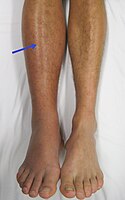
Photo from wikipedia
Patients with mechanical heart valves (MHV)s require lifelong anticoagulation to prevent thromboembolic complications (TECs). Women with MHVs in pregnancy experience an increased risk of severe maternal morbidity and mortality from… Click to show full abstract
Patients with mechanical heart valves (MHV)s require lifelong anticoagulation to prevent thromboembolic complications (TECs). Women with MHVs in pregnancy experience an increased risk of severe maternal morbidity and mortality from both thrombotic and bleeding complications. A large international registry of pregnancies with MHVs revealed that valve thrombosis and maternal mortality occurred in 4.7% and 1.4% of women, respectively, and hemorrhage complicated 23% of pregnancies.1 Of importance, only 58% of women with MHVs were free from serious adverse events during pregnancy compared with 79% of women with bioprosthetic valves and 78% of women with cardiac disease and no prosthetic valves.1 Vitamin K antagonists (VKAs), such as warfarin, are the standard anticoagulation modality for nonpregnant patients with MHVs. However, VKAs readily traverse the placenta and are teratogenic. Indeed, warfarinassociated embryopathy may occur with firsttrimester VKA exposure consisting of developmental anomalies affecting bones and cartilage.2,3 Moreover, administration of VKAs in the second and third trimesters can lead to a warfarinassociated fetopathy, characterized by central nervous system anomalies potentially from microhemorrhages in brain tissue.2,3 Alternative options to VKAs are low molecular weight heparins (LMWHs). However, LMWHs have been associated with higher frequency of maternal valvular thrombosis and mortality, and their use for anticoagulation of MHVs remains offlabel.4 The main options for anticoagulation regimens have been described in pregnancy with the aim of reducing maternal fetal risks include (a) VKAs throughout pregnancy, (b) LMWH throughout pregnancy, (c) LMWH in the first trimester and VKAs in the second and third trimester (sequential treatment), and (d) unfractionated heparin (UFH) throughout pregnancy.5,6 Outcomes associated with these strategies have predominantly been described by observational studies, which are inherently at increased risk of bias.4 In addition, society guidelines have mostly issued recommendations regarding the choice of anticoagulation modality,5 and practices regarding adjunctive antiplatelet therapy in pregnancy are not well described. The optimal anticoagulation management strategy for pregnant women with MHVs thus has not yet been determined. Assessing current anticoagulation practice is a necessary step for planning
Journal Title: Journal of Thrombosis and Haemostasis
Year Published: 2021
Link to full text (if available)
Share on Social Media: Sign Up to like & get
recommendations!